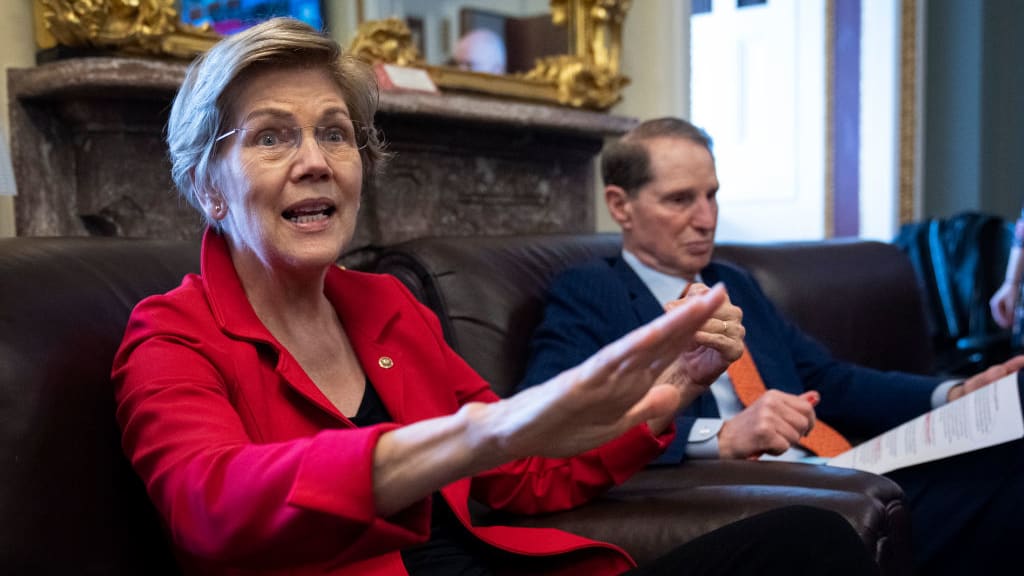Senate Democrats release updated corporate minimum tax proposal


A free daily email with the biggest news stories of the day – and the best features from TheWeek.com
You are now subscribed
Your newsletter sign-up was successful
Sen. Elizabeth Warren (D-Mass.), Sen. Ron Wyden (D-Ore.), and Sen. Angus King (I-Maine) on Tuesday released new details about a Democratic plan to impose a 15 percent minimum corporate tax on some of the country's biggest companies.
This tax could be used to help fund the social spending bill Democrats are negotiating, and after the plan was unveiled, Sen. Kyrsten Sinema (D-Ariz.), one of the moderates who had previously objected to a tax-rate increase, said she would support the corporate minimum tax, CNBC reports.
As their plan stands now, the corporate minimum tax would apply to companies that publicly report more than $1 billion in profits annually over three years, creating a 15 percent minimum tax on those profits. There would be business credits, the senators said in a press release, "including R&D, clean energy, and housing tax credits," as well as "some flexibilities for companies to carry forward losses, utilize foreign tax credits, and claim a minimum tax credit against regular tax in future years."
The Week
Escape your echo chamber. Get the facts behind the news, plus analysis from multiple perspectives.

Sign up for The Week's Free Newsletters
From our morning news briefing to a weekly Good News Newsletter, get the best of The Week delivered directly to your inbox.
From our morning news briefing to a weekly Good News Newsletter, get the best of The Week delivered directly to your inbox.
The senators estimate the tax would apply to roughly 200 U.S. corporations, like Amazon, which reported $45 billion in profits over the last three years but paid, they noted, "an effective tax rate of just 4.3 percent — well below the 21 percent corporate tax rate."
Wyden, chair of the Senate Finance Committee, said in a statement that "the most profitable corporations in the country are often the worst offenders when it comes to paying their fair share. Year after year they report record profits to shareholders and pay little to no taxes. Our proposal would tackle the most egregious corporate tax dodging by ensuring the biggest companies pay a minimum tax."
The proposal has not yet been formally approved by House or Senate leaders, CNBC reports, but Warren said she and her colleagues "extensively" discussed the matter with the White House, Senate Finance Committee, and the Treasury Department to get it included in the Build Back Better deal.
A free daily email with the biggest news stories of the day – and the best features from TheWeek.com
Catherine Garcia has worked as a senior writer at The Week since 2014. Her writing and reporting have appeared in Entertainment Weekly, The New York Times, Wirecutter, NBC News and "The Book of Jezebel," among others. She's a graduate of the University of Redlands and the Columbia University Graduate School of Journalism.
-
 How the FCC’s ‘equal time’ rule works
How the FCC’s ‘equal time’ rule worksIn the Spotlight The law is at the heart of the Colbert-CBS conflict
-
 What is the endgame in the DHS shutdown?
What is the endgame in the DHS shutdown?Today’s Big Question Democrats want to rein in ICE’s immigration crackdown
-
 ‘Poor time management isn’t just an inconvenience’
‘Poor time management isn’t just an inconvenience’Instant Opinion Opinion, comment and editorials of the day
-
 Witkoff and Kushner tackle Ukraine, Iran in Geneva
Witkoff and Kushner tackle Ukraine, Iran in GenevaSpeed Read Steve Witkoff and Jared Kushner held negotiations aimed at securing a nuclear deal with Iran and an end to Russia’s war in Ukraine
-
 Pentagon spokesperson forced out as DHS’s resigns
Pentagon spokesperson forced out as DHS’s resignsSpeed Read Senior military adviser Col. David Butler was fired by Pete Hegseth and Homeland Security spokesperson Tricia McLaughlin is resigning
-
 ‘The forces he united still shape the Democratic Party’
‘The forces he united still shape the Democratic Party’Instant Opinion Opinion, comment and editorials of the day
-
 Judge orders Washington slavery exhibit restored
Judge orders Washington slavery exhibit restoredSpeed Read The Trump administration took down displays about slavery at the President’s House Site in Philadelphia
-
 Hyatt chair joins growing list of Epstein files losers
Hyatt chair joins growing list of Epstein files losersSpeed Read Thomas Pritzker stepped down as executive chair of the Hyatt Hotels Corporation over his ties with Jeffrey Epstein and Ghislaine Maxwell
-
 How are Democrats turning DOJ lemons into partisan lemonade?
How are Democrats turning DOJ lemons into partisan lemonade?TODAY’S BIG QUESTION As the Trump administration continues to try — and fail — at indicting its political enemies, Democratic lawmakers have begun seizing the moment for themselves
-
 Judge blocks Hegseth from punishing Kelly over video
Judge blocks Hegseth from punishing Kelly over videoSpeed Read Defense Secretary Pete Hegseth pushed for the senator to be demoted over a video in which he reminds military officials they should refuse illegal orders
-
 Trump’s EPA kills legal basis for federal climate policy
Trump’s EPA kills legal basis for federal climate policySpeed Read The government’s authority to regulate several planet-warming pollutants has been repealed
